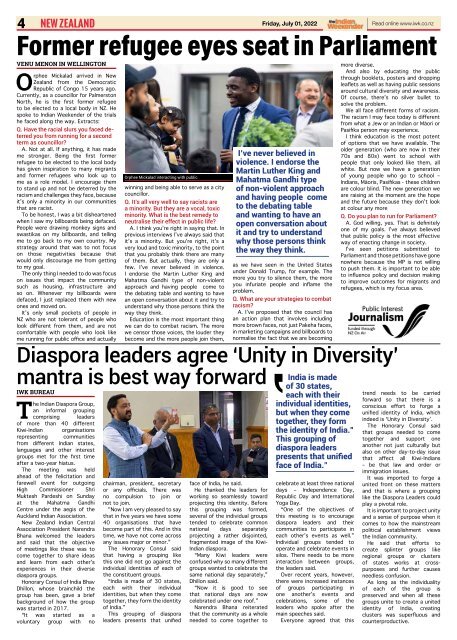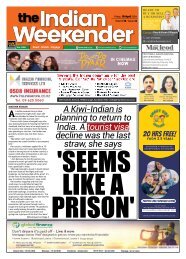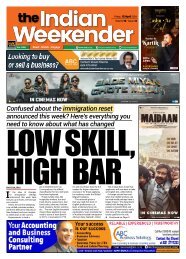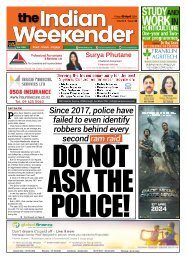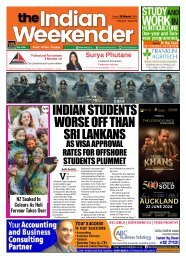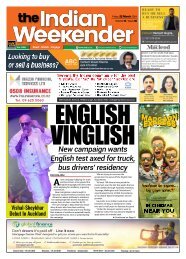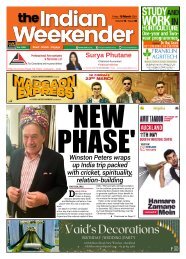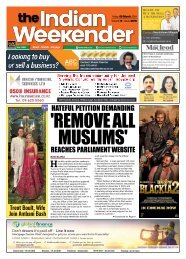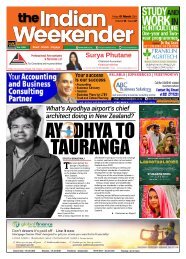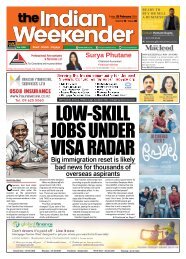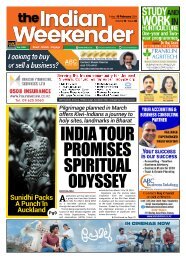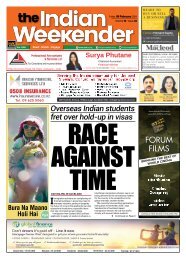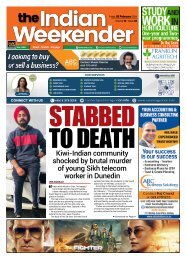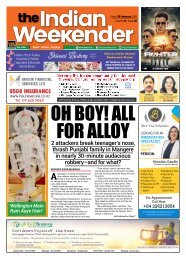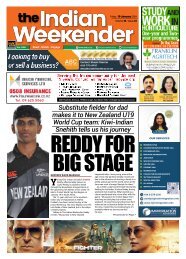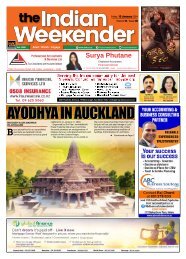Create successful ePaper yourself
Turn your PDF publications into a flip-book with our unique Google optimized e-Paper software.
4<br />
NEW ZEALAND<br />
Friday, <strong>July</strong> <strong>01</strong>, <strong>2022</strong><br />
Read online www.iwk.co.nz<br />
Former refugee eyes seat in Parliament<br />
VENU MENON IN WELLINGTON<br />
Orphee Mickalad arrived in New<br />
Zealand from the Democratic<br />
Republic of Congo 15 years ago.<br />
Currently, as a councillor for Palmerston<br />
North, he is the first former refugee<br />
to be elected to a local body in NZ. He<br />
spoke to <strong>Indian</strong> <strong>Weekender</strong> of the trials<br />
he faced along the way. Extracts:<br />
Q. Have the racial slurs you faced deterred<br />
you from running for a second<br />
term as councillor?<br />
A. Not at all. If anything, it has made<br />
me stronger. Being the first former<br />
refugee to be elected to the local body<br />
has given inspiration to many migrants<br />
and former refugees who look up to<br />
me as a role model. I encourage them<br />
to stand up and not be deterred by the<br />
racism and challenges they face, because<br />
it’s only a minority in our communities<br />
that are racist.<br />
To be honest, I was a bit disheartened<br />
when I saw my billboards being defaced.<br />
People were drawing monkey signs and<br />
swastikas on my billboards, and telling<br />
me to go back to my own country. My<br />
strategy around that was to not focus<br />
on those negativities because that<br />
would only discourage me from getting<br />
to my goal.<br />
<strong>The</strong> only thing I needed to do was focus<br />
on issues that impact the community<br />
such as housing, infrastructure and<br />
so on. Whenever my billboards were<br />
defaced, I just replaced them with new<br />
ones and moved on.<br />
It’s only small pockets of people in<br />
NZ who are not tolerant of people who<br />
look different from them, and are not<br />
comfortable with people who look like<br />
me running for public office and actually<br />
winning and being able to serve as a city<br />
councillor.<br />
Q. It’s all very well to say racists are<br />
a minority. But they are a vocal, toxic<br />
minority. What is the best remedy to<br />
neutralise their effect in public life?<br />
A. I think you’re right in saying that. In<br />
previous interviews I’ve always said that<br />
it’s a minority. But you’re right, it’s a<br />
very loud and toxic minority, to the point<br />
that you probably think there are many<br />
of them. But actually, they are only a<br />
few. I’ve never believed in violence.<br />
I endorse the Martin Luther King and<br />
Mahatma Gandhi type of non-violent<br />
approach and having people come to<br />
the debating table and wanting to have<br />
an open conversation about it and try to<br />
understand why those persons think the<br />
way they think.<br />
Education is the most important thing<br />
we can do to combat racism. <strong>The</strong> more<br />
we censor those voices, the louder they<br />
become and the more people join them,<br />
as we have seen in the United States<br />
under Donald Trump, for example. <strong>The</strong><br />
more you try to silence them, the more<br />
you infuriate people and inflame the<br />
problem.<br />
Q. What are your strategies to combat<br />
racism?<br />
A. I’ve proposed that the council has<br />
an action plan that involves including<br />
more brown faces, not just Pakeha faces,<br />
in marketing campaigns and billboards to<br />
normalise the fact that we are becoming<br />
more diverse.<br />
And also by educating the public<br />
through booklets, posters and dropping<br />
leaflets as well as having public sessions<br />
around cultural diversity and awareness.<br />
Of course, there’s no silver bullet to<br />
solve the problem.<br />
We all face different forms of racism.<br />
<strong>The</strong> racism I may face today is different<br />
from what a Jew or an <strong>Indian</strong> or Māori or<br />
Pasifika person may experience.<br />
I think education is the most potent<br />
of options that we have available. <strong>The</strong><br />
older generation (who are now in their<br />
70s and 80s) went to school with<br />
people that only looked like them, all<br />
white. But now we have a generation<br />
of young people who go to school –<br />
<strong>Indian</strong>s, Māoris, Pasifikas - these children<br />
are colour blind. <strong>The</strong> new generation we<br />
are raising at the moment are the hope<br />
and the future because they don’t look<br />
at colour any more<br />
Q. Do you plan to run for Parliament?<br />
A. God willing, yes. That is definitely<br />
one of my goals. I’ve always believed<br />
that public policy is the most effective<br />
way of enacting change in society.<br />
I’ve seen petitions submitted to<br />
Parliament and those petitions have gone<br />
nowhere because the MP is not willing<br />
to push them. It is important to be able<br />
to influence policy and decision making<br />
to improve outcomes for migrants and<br />
refugees, which is my focus area.<br />
Diaspora leaders agree ‘Unity in Diversity’<br />
mantra is best way forward<br />
IWK BUREAU<br />
<strong>The</strong> <strong>Indian</strong> Diaspora Group,<br />
an informal grouping<br />
comprising leaders<br />
of more than 40 different<br />
Kiwi-<strong>Indian</strong> organisations<br />
representing communities<br />
from different <strong>Indian</strong> states,<br />
languages and other interest<br />
groups met for the first time<br />
after a two-year hiatus.<br />
<strong>The</strong> meeting was held<br />
ahead of the felicitation and<br />
farewell event for outgoing<br />
High Commissioner Shri<br />
Muktesh Pardeshi on Sunday<br />
at the Mahatma Gandhi<br />
Centre under the aegis of the<br />
Auckland <strong>Indian</strong> Association.<br />
New Zealand <strong>Indian</strong> Central<br />
Association President Narendra<br />
Bhana welcomed the leaders<br />
and said that the objective<br />
of meetings like these was to<br />
come together to share ideas<br />
and learn from each other’s<br />
experiences in their diverse<br />
diaspora groups.<br />
Honorary Consul of India Bhav<br />
Dhillon, whose brainchild the<br />
group has been, gave a brief<br />
background of how the group<br />
was started in 2<strong>01</strong>7.<br />
“It was started as a<br />
voluntary group with no<br />
Orphee Mickalad interacting with public<br />
chairman, president, secretary<br />
or any officials. <strong>The</strong>re was<br />
no compulsion to join or<br />
not to join.<br />
"Now I am very pleased to say<br />
that in five years we have some<br />
40 organisations that have<br />
become part of this. And in this<br />
time, we have not come across<br />
any issues major or minor.”<br />
<strong>The</strong> Honorary Consul said<br />
that having a grouping like<br />
this one did not go against the<br />
individual identities of each of<br />
the constituent groups.<br />
“India is made of 30 states,<br />
each with their individual<br />
identities, but when they come<br />
together, they form the identity<br />
of India.”<br />
This grouping of diaspora<br />
leaders presents that unified<br />
face of India, he said.<br />
He thanked the leaders for<br />
working so seamlessly toward<br />
projecting this identity. Before<br />
this grouping was formed,<br />
several of the individual groups<br />
tended to celebrate common<br />
national days separately<br />
projecting a rather disjointed,<br />
fragmented image of the Kiwi-<br />
<strong>Indian</strong> diaspora.<br />
“Many Kiwi leaders were<br />
confused why so many different<br />
groups wanted to celebrate the<br />
same national day separately,”<br />
Dhillon said.<br />
“Now it is good to see<br />
that national days are now<br />
celebrated under one roof.”<br />
Narendra Bhana reiterated<br />
that the community as a whole<br />
needed to come together to<br />
I’ve never believed in<br />
violence. I endorse the<br />
Martin Luther King and<br />
Mahatma Gandhi type<br />
of non-violent approach<br />
and having people come<br />
to the debating table<br />
and wanting to have an<br />
open conversation about<br />
it and try to understand<br />
why those persons think<br />
the way they think.<br />
India is made<br />
of 30 states,<br />
each with their<br />
individual identities,<br />
but when they come<br />
together, they form<br />
the identity of India.”<br />
This grouping of<br />
diaspora leaders<br />
presents that unified<br />
face of India."<br />
celebrate at least three national<br />
days – Independence Day,<br />
Republic Day and International<br />
Yoga Day.<br />
“One of the objectives of<br />
this meeting is to encourage<br />
diaspora leaders and their<br />
communities to participate in<br />
each other’s events as well.”<br />
Individual groups tended to<br />
operate and celebrate events in<br />
silos. <strong>The</strong>re needs to be more<br />
interaction between groups,<br />
the leaders said.<br />
Over recent years, however,<br />
there were increased instances<br />
of groups participating in<br />
one another’s events and<br />
celebrations, some of the<br />
leaders who spoke after the<br />
main speeches said.<br />
Everyone agreed that this<br />
trend needs to be carried<br />
forward so that there is a<br />
conscious effort to forge a<br />
unified identity of India, which<br />
indeed is ‘Unity in Diversity’.<br />
<strong>The</strong> Honorary Consul said<br />
that groups needed to come<br />
together and support one<br />
another not just culturally but<br />
also on other day-to-day issue<br />
that affect all Kiwi-<strong>Indian</strong>s<br />
– be that law and order or<br />
immigration issues.<br />
It was imported to forge a<br />
united front on these matters<br />
and that is where a grouping<br />
like the Diaspora Leaders could<br />
play a pivotal role.<br />
It is important to project unity<br />
and a sense of purpose when it<br />
comes to how the mainstream<br />
political establishment views<br />
the <strong>Indian</strong> community.<br />
He said that efforts to<br />
create splinter groups like<br />
regional groups or clusters<br />
of states works at crosspurposes<br />
and further causes<br />
needless confusion.<br />
As long as the individuality<br />
of each of the group is<br />
preserved and when all these<br />
groups unite to create a united<br />
identity of India, creating<br />
clusters was superfluous and<br />
counterproductive.


